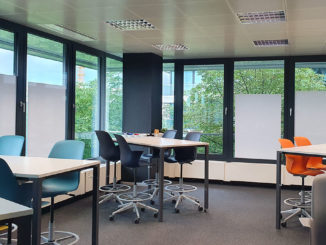
We all know the phenomenon of déjà vu. But what is vuja de all about? Prof. Dr. Stefan Baldi explains the meaning of vuja de and how this phenomenon can promote innovation.
Write the word “house” – or another simple word – onto a sheet of paper 30 times. Look at the words well. Let them have their effect on you. Do you notice anything? For many, the word written loses meaning. Some doubt that it actually is a real word. This effect, called “semantic satiation”, is caused by stimulation of specific neuronal patterns that are increasingly weakened by repetition (Jakobovits, 1962). We feel like we are looking at a familiar word through different eyes.
From Déjà vu to Vuja de
The phenomenon described is the virtual opposite of a déjà vu experience: it is not that an unfamiliar situation suddenly looks familiar, but that something that is actually familiar appears unexpectedly strange. The wordplay vuja de based on this is first documented in a show of US comedian George Carlin: “Vuja de: This is the strange feeling that, somehow, none of that has ever happened before” (Carlin, n.d.). In innovation research, the term was taken up, among others, by Robert Sutton (Sutton, 2002) and recently discussed again by Adam Grant in his book “Originals” (Grant, 2016).
There actually is a psychological technical term for vuja de: jamais vu (French for “never seen”) describes the phenomenon of perceiving something that is actually familiar as strange or new (Spector, 2011). Jamais vu experiences may happen to healthy people or be side effects of mental illnesses. A jamais vu experience is characterized by being a temporary phenomenon that can be classified consciously in a reflection phase. Innovation research often prefers the wordplay vuja de to the technical term from psychology in order to focus on the positive character of the phenomenon. Generally, a jamais vu experience may in fact have negative consequences, e.g. when previously carefully practiced behavioural patterns cannot be recalled in a situation of crisis.
Vuja de and Innovation
The fresh look at products, processes or customers assumed to be familiar enables us to ask the right questions and thus to find approaches to possible innovations:
- The fresh look of Tony Fadell at everyday objects such as thermostats or smoke detectors led to the foundation of the automation company Nest in 2010, which produces self-learning and linked controllers for the private household. The company was sold to Google for more than three billion USD in 2014.
- In 2007, Joe Gebbia and Brian Chesky, then short on cash, realized that their living room offered special value during a large conference in San Francisco. All hotels were booked to capacity, and so they offered three airbeds with breakfast on a website they set up for this: airbedandbreakfast.com. This fresh look at their own living room became Airbnb, with a value of several billion USD today.
The ability to challenge familiar situations and see them through different eyes is an essential prerequisite for innovation. All too often, we simply accept existing situations and let them continue, although reasons that had originally led to the design in the current shape may have long ceased to exist or be about to disappear (in the worst case, they were never valid to begin with).
Today, if someone wants to have a car at their disposal anytime, they must own the vehicle. If they are willing to accept limited availability, they can use a car sharing system. If autonomous vehicles are able to move to the desired deployment site on their own in future, vehicle possession may not be the prerequisite for high individual availability anymore. Quite the opposite: high availability could be combined in an unprecedented manner with higher flexibility of vehicle types and sites of use.
The fresh look and a vuja de experience help not only when developing disruptive innovations: The website that you put a lot of work into developing two years ago and that was then at the state of the art may already have lost its attraction to potential new customers. The reception area of your company, renovated with great effort, may have turned out not to be functional and developed from a design jewel into an unattractive parcel storage site over time. Have a good look.We all know the phenomenon of déjà vu. But what is vuja-de all about? Prof. Dr. Stefan Baldi explains the meaning of vuja-de and how this phenomenon can promote innovation.
How to See Things Differently
How can you systematically generate vuja de moments to see things differently and strengthen the innovation process? Some approaches promise success, though they cannot guarantee it:
- Sharpening your own senses: Research shows that a little movement can be enough to sharpen your senses. After a short time, the protein BDNF (Brain-Derived Neurotrophic Factor) is produced. It stimulates the development of nerve cells and the formation of neuronal connections (Hallowell, 2008, p. 60). This gives a walk the effect of a symbolic reset button that makes it easier to take a new point of view. Alongside your eyes, use your other senses as well: What do you hear? What do you smell? What do you taste? What do you feel?
- Using the eyes of others: If your own eyes have become too accustomed to the way things are, use the eyes of others who are caught as little as possible in operational routines. They may be new customers or new employees; persons from outside your profession or your industry; persons from a different cultural environment. Some matters of course will be challenged in personal exchange.
- Looking at other things: Regular benchmarking within the own industry is interesting and helpful. Regarding innovations, however, it is important to look over the rim of your teacup, e.g. at start-ups or companies from other industries that share essential attributes with your own. Complex surgery in the medical area that requires high concentration and focus on the patient may have similar requirements to the processes in an aeroplane cockpit when taking off and touching down. A team of a healthcare company also visited flight schools, car dealers, a supermarket and a forensic expert to get new ideas for their own working environment (Chow & Zuber, 2008).
- Leaving the routine behind: Even small changes to the workflow may provide a decisive impulse for breaking through routines. Have your meeting outside of your company, at a different time than usual or with different participants.
- Back to the basics: Managers and supervisors often are separated from the “actual” goings-on in their company by their tasks. Experience a working week with the dealer on site, in phone support or in a different department. Try experiencing your company’s offer as a potential customer. Use a virtual customer journey or, better yet, the actual thing. You don’t have to play “Undercover Boss” on TV for that.
- Visualizing ideas: Don’t only play out new ideas in theory and write down concepts, but develop prototypes that can already specifically map essential properties and that you can interact with. This way you – as well as others – can already get the feel of your idea and experience it with multiple senses.
- Switching off and re-focusing: Try removing yourself entirely from your environment and your daily tasks for a few days. Take a trip, go on a journey. At your return, try seeing things with the open mind of a beginner, following the concept of Shoshin (English: beginner’s mind) from Zen Buddhism, even if you are actually an expert in your area.
Many of these techniques share a change of perspective that is taken either on one’s own or with the help of others.
Vuja de When Studying?
Being able to produce vuja de moments is an important reason why changes of perspective are systematically integrated in the curriculum and the learning environment of Munich Business School. This is why the teaching concept promotes and challenges this ability in the linked competence fields of “knowing”, “acting” and “being” (Baldi, 2016). Some examples:
- Mandatory stays abroad require immersion in foreign cultures and their special characteristics. They also help to better understand one’s own culture and to see it through different eyes. Vuja de experiences in particular occur in the form of reverse culture shock upon return.
- Social Service Projects for Bachelor students require actively dealing with the foreign environments of disadvantaged groups and/or individual fates that in turn affect one’s own self-conception and value system.
- Changing learning locations between internship location or workplace and the university promotes a different look at theoretical learning contents and its practical application.
- A mandatory international focus on culture, society and economy of a chosen region of the world and teaching of foreign languages not only prepares for possible stays abroad, but also provides a new view of one’s own culture. This applies equally to lectures from the area of business and culture history which make our present time appear in a different light.
- The diverse composition of the students and lecturers, combined with the ability and necessity of personal interaction on teaching contents and practical problems, promotes a change of perspective. Diversity refers to international cultural roots as well as to different professional experiences and academic backgrounds.
- In interdisciplinary courses, theoretical contents are specifically supplemented with practical mindfulness exercises. In the “Success Factor Happiness” course, for example, these are done with the instruction of a Zen teacher. One homework assignment of the entrepreneurship class is to go on an attentive walk and document observations. It’s not some esoteric mumbo jumbo, but helps to see things anew and thus strengthens innovation competence.
All of these changes of perspective are targeted at opening one’s eyes and inspiring vuja de experiences in studies, profession and everyday life. The ability to change perspective is a basic prerequisite for the development of empathy. It helps determine our own position in economy and society and therefore is an important management competence (Albrecht, 2015). For these reasons too, students at Munich Business School are repeatedly faced with situations and contents that require a change of perspective.
Start Your Journey of Discovery Today
“The true journey of discovery is not in finding new landscapes, but in seeing through different eyes,” says Marcel Proust. The next time you enter your office or your living room: Deliberately try to see the room through different eyes. How does a first-time visitor perceive the room? Maybe you can have a little vuja de.
Literature:
- Albrecht, E. (2015). Change of Perspective – The New Leadership Skill. Retrieved from http://www.munich-business-school.de/insights/en/2015/change-of-perspective-%e2%80%92-the-new-leadership-skill/
- Baldi, S. (2016). Knowing, Doing, Being – Developing Management Competencies for 2020. Retrieved June 30, 2016, from http://www.munich-business-school.de/insights/en/2016/knowing-doing-being/
- Carlin, G. (n.d.). Vuja de. Retrieved from http://www.youtube.com/watch?v=B7LBSDQ14eA
- Chow, M. P., & Zuber, C. J. (2008). Striving for Vuja De: Developing Eyes for Creativity. Retrieved from http://innovations.ahrq.gov/perspectives/striving-vuja-de-developing-eyes-creativity
- Grant, A. (2016). How Non-Conformists Move the World. New York: Viking.
- Hallowell, E. M. (2008). Overloaded Circuits : Why Smart People Underperform. Harvard Business Review, (January), 55–62.
- Jakobovits, L. A. (1962). Effects of repeated stimulation on cognitive aspects of behavior: some experiments on the phenomenon of semantic satiation. McGill University, Montreal, Canada.
- Spector, F. (2011). Jamais Vu. In J. S. Kreutzer, J. DeLuca, & B. Caplan (Eds.), Encyclopedia of Clinical Neuropsychology (p. 1363). New York, NY: Springer New York. https://doi.org/10.1007/978-0-387-79948-3_1167
- Sutton, R. I. (2002). Weird Ideas That Work: 11 1/2 Practices for Promoting, Managing, and Sustaining Innovation. New York: The Free Press.

You are interested in economics and want to acquire in-depth business know-how?
Then the international business degrees at Munich Business School (MBS) are just right for you! At MBS you won’t cram dry theory from old textbooks, but learn in a outcome-oriented way and gain valuable practical experience. Convince yourself:
Bachelor’s in International Business
Master’s in International Business
Master’s in International Business I Finance
Master’s in Innovation and Entrepreneurship
Master’s in International Marketing and Brand Management
Master’s in Sports Business and Communication
MBA General Management
Doctor of Business Administration




